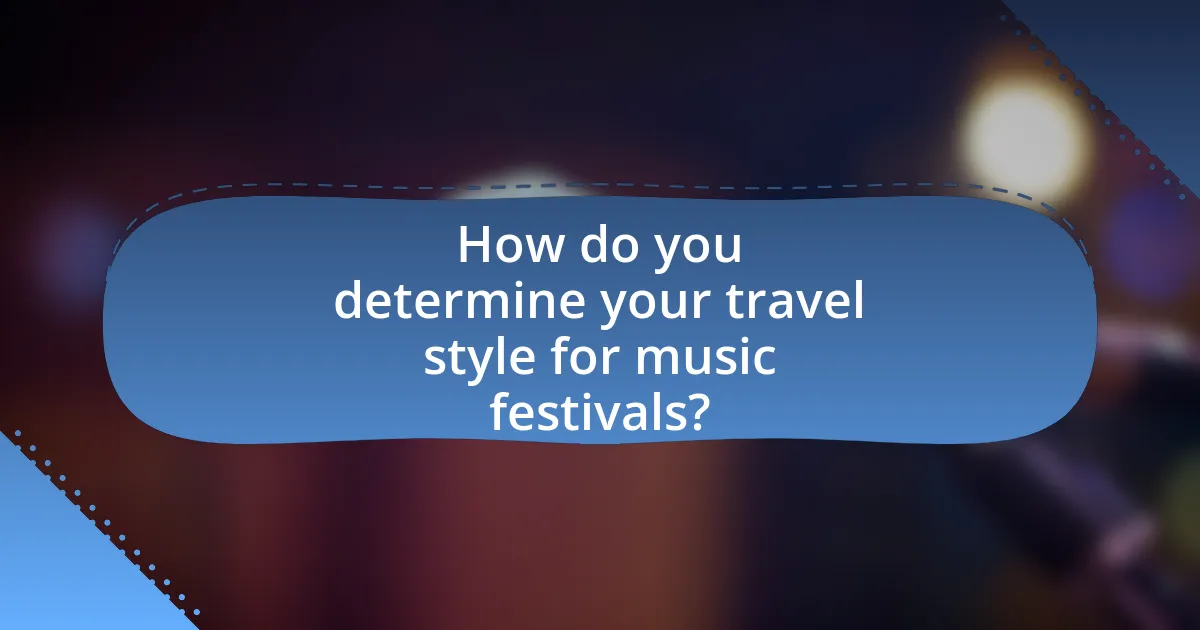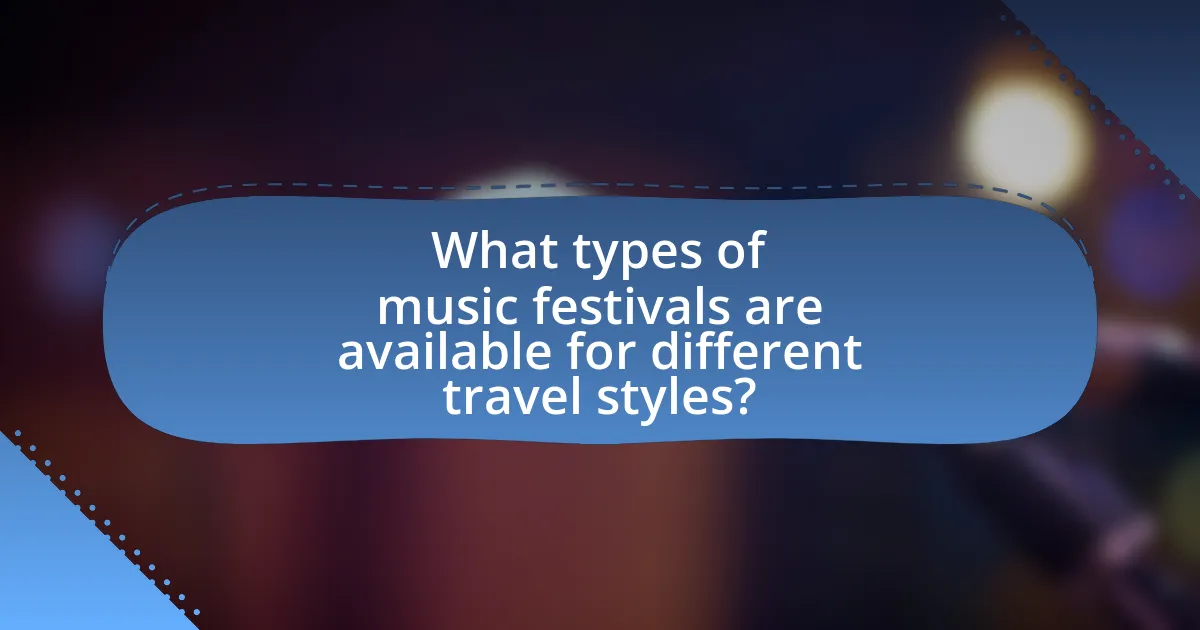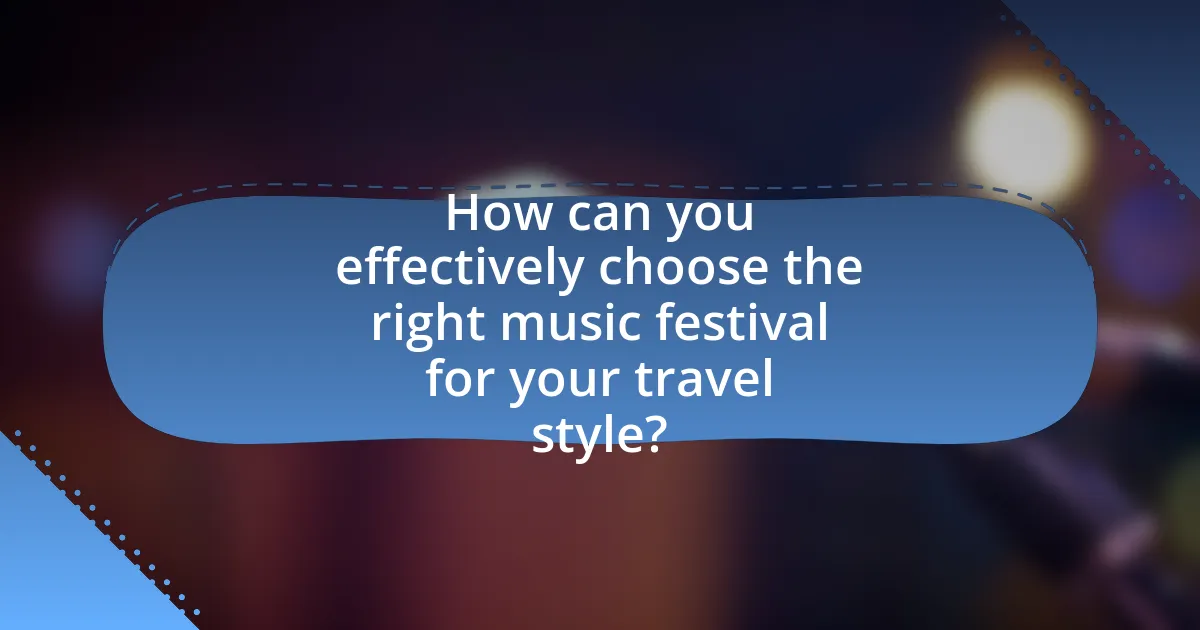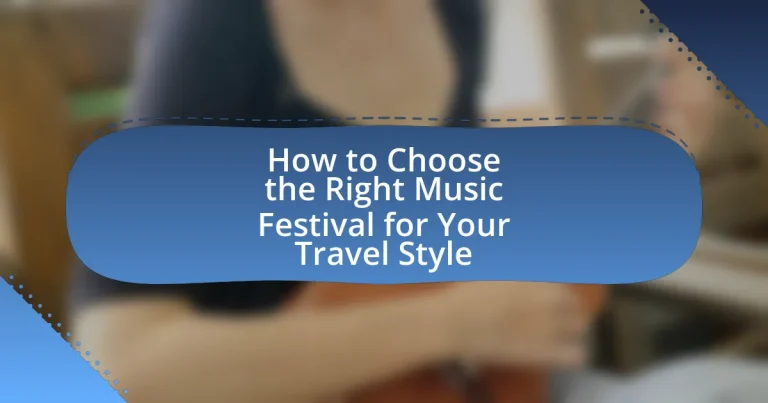The article focuses on how to choose the right music festival based on individual travel styles. It outlines various travel styles, including camping, glamping, day-tripping, and hotel stays, and discusses how factors such as budget, comfort, and social interaction preferences influence these choices. The article also highlights the differences between backpackers and luxury travelers, the impact of family dynamics on festival selection, and the importance of aligning travel styles with festival environments for enhanced enjoyment. Additionally, it provides practical steps for researching and selecting festivals that match personal preferences, while emphasizing the significance of logistical considerations and avoiding common pitfalls in the planning process.

How do you determine your travel style for music festivals?
To determine your travel style for music festivals, assess your preferences for comfort, budget, and social interaction. Comfort levels can dictate whether you prefer camping, staying in hotels, or renting an RV, while budget considerations will influence your choice of accommodations and travel methods. Social interaction preferences will help you decide if you want to attend festivals solo, with friends, or as part of a larger group. For example, a survey by Eventbrite found that 78% of festival-goers prioritize social experiences, indicating that understanding your social needs is crucial in shaping your travel style.
What are the different travel styles for attending music festivals?
Different travel styles for attending music festivals include camping, glamping, day-tripping, and hotel stays. Camping allows festival-goers to immerse themselves in the festival atmosphere, often at a lower cost, while glamping offers a more luxurious experience with amenities. Day-tripping involves attending the festival without overnight accommodations, appealing to those who prefer to return home each night. Hotel stays provide comfort and convenience, often at a higher price point, and are suitable for attendees seeking a more relaxed experience. Each style caters to varying preferences for comfort, budget, and festival engagement.
How does a backpacker’s approach differ from a luxury traveler’s?
A backpacker’s approach to travel emphasizes budget-friendly options, flexibility, and immersive experiences, while a luxury traveler prioritizes comfort, exclusivity, and high-end amenities. Backpackers typically seek affordable accommodations like hostels or camping, often using public transportation and engaging with local cultures, which allows for spontaneous travel plans. In contrast, luxury travelers often book five-star hotels, private transfers, and curated experiences, ensuring a more structured and comfortable journey. This distinction is evident in travel spending patterns; for instance, a 2020 study by the Adventure Travel Trade Association found that adventure travelers, including backpackers, spend an average of $1,000 per trip, while luxury travelers can spend upwards of $5,000 for similar durations, highlighting the significant differences in their travel philosophies.
What factors influence a family’s travel style for music festivals?
A family’s travel style for music festivals is influenced by factors such as budget, age of family members, interests in music genres, and logistical considerations like distance and accommodation. Budget determines the type of festival and travel arrangements a family can afford, while the age of family members affects the choice of festival activities and amenities. Interests in specific music genres guide the selection of festivals that align with family preferences. Logistical considerations, including the distance to the festival and the availability of suitable accommodations, also play a crucial role in shaping the overall travel experience.
Why is it important to align your travel style with a music festival?
Aligning your travel style with a music festival is crucial because it enhances your overall experience and satisfaction. When your travel preferences, such as accommodation, transportation, and social interactions, match the festival’s environment, you are more likely to enjoy the event fully. For instance, a festival that emphasizes camping and communal living may not suit someone who prefers luxury accommodations and private experiences. Studies show that attendees who feel comfortable in their surroundings report higher levels of enjoyment and engagement, leading to a more memorable experience. Therefore, ensuring compatibility between your travel style and the festival’s offerings can significantly impact your enjoyment and fulfillment during the event.
How can mismatched travel styles affect your festival experience?
Mismatched travel styles can significantly detract from your festival experience by creating conflicts in preferences and expectations. For instance, if one traveler prefers a laid-back, leisurely approach while another favors a fast-paced, action-packed itinerary, this divergence can lead to frustration and dissatisfaction. Research indicates that compatibility in travel styles enhances group cohesion and overall enjoyment, as seen in a study published in the Journal of Travel Research, which found that shared travel preferences correlate with higher satisfaction levels among participants. Therefore, aligning travel styles is crucial for maximizing enjoyment at music festivals.
What are the benefits of choosing a festival that matches your travel style?
Choosing a festival that matches your travel style enhances your overall experience by ensuring that the activities, atmosphere, and community align with your preferences. When travelers select festivals that resonate with their interests—such as electronic music, cultural celebrations, or intimate gatherings—they are more likely to engage fully and enjoy the event. Research indicates that participants who attend events that reflect their personal values and interests report higher satisfaction levels, as seen in studies conducted by the Event Marketing Institute, which found that 84% of attendees feel more connected to brands and communities that align with their lifestyle. This alignment fosters a deeper connection to the festival, leading to memorable experiences and lasting friendships.

What types of music festivals are available for different travel styles?
Various types of music festivals cater to different travel styles, including camping festivals, urban festivals, boutique festivals, and destination festivals. Camping festivals, such as Coachella and Glastonbury, offer immersive experiences in nature, appealing to adventurous travelers. Urban festivals, like Lollapalooza and Austin City Limits, provide a vibrant city atmosphere, attracting those who enjoy cultural exploration. Boutique festivals, such as the Newport Folk Festival, focus on intimate settings and unique lineups, appealing to discerning music lovers. Destination festivals, like Tomorrowland in Belgium, combine travel with a festival experience, drawing attendees who seek a vacation-like atmosphere. Each type of festival aligns with specific travel preferences, ensuring diverse options for attendees.
How do genre-specific festivals cater to various travel styles?
Genre-specific festivals cater to various travel styles by offering tailored experiences that align with the preferences and interests of different attendees. For instance, electronic dance music festivals often provide immersive environments with elaborate stage designs and vibrant nightlife, appealing to younger, party-oriented travelers. In contrast, folk music festivals typically emphasize community and cultural exchange, attracting those who prefer a more laid-back, family-friendly atmosphere. Additionally, festivals focused on specific genres, such as jazz or classical, often feature curated lineups and workshops that cater to enthusiasts seeking deeper engagement with the music. This diversity in programming allows festivals to attract a wide range of participants, from casual listeners to dedicated fans, thereby accommodating various travel styles and preferences.
What are the unique features of electronic music festivals for travelers?
Electronic music festivals offer unique features for travelers, including immersive experiences, diverse cultural interactions, and extensive networking opportunities. These festivals often feature elaborate stage designs, cutting-edge technology, and visual art installations that enhance the overall experience, making them visually captivating. Additionally, they attract a global audience, allowing travelers to connect with people from various backgrounds, fostering cultural exchange. Networking opportunities abound, as attendees can meet artists, industry professionals, and fellow music enthusiasts, which can lead to collaborations or friendships. According to a study by the International Music Summit, electronic music festivals contribute significantly to local economies, further emphasizing their importance as travel destinations.
How do folk and cultural festivals appeal to different travel preferences?
Folk and cultural festivals appeal to different travel preferences by offering diverse experiences that cater to various interests, such as cultural immersion, entertainment, and social interaction. For instance, travelers seeking authentic cultural experiences may prefer folk festivals that showcase local traditions, music, and cuisine, allowing them to engage deeply with the community. In contrast, those looking for entertainment might be drawn to larger cultural festivals featuring popular artists and performances, providing a vibrant atmosphere for socializing and enjoyment. According to a study by the National Endowment for the Arts, festivals that highlight local culture can enhance community engagement and attract tourists interested in unique, place-based experiences. This evidence supports the idea that folk and cultural festivals can effectively meet the varied preferences of travelers.
What are the key characteristics of destination festivals?
Destination festivals are characterized by their unique location, cultural immersion, and a strong sense of community among attendees. These festivals typically take place in scenic or culturally significant areas, attracting visitors who seek both entertainment and exploration. For example, events like Coachella in California or Tomorrowland in Belgium not only feature renowned artists but also offer an opportunity to experience local culture and attractions. Additionally, destination festivals often include various activities beyond music, such as art installations, culinary experiences, and workshops, enhancing the overall experience for attendees. This combination of location, cultural engagement, and diverse offerings distinguishes destination festivals from regular music events.
How do destination festivals enhance the travel experience?
Destination festivals enhance the travel experience by providing unique cultural immersion and opportunities for social interaction. These festivals often showcase local traditions, music, and cuisine, allowing travelers to engage with the destination’s heritage. For example, events like the Carnival in Rio de Janeiro or the Holi Festival in India attract visitors from around the world, creating a vibrant atmosphere that fosters connections among attendees. Additionally, studies indicate that participation in such festivals can lead to increased satisfaction and memorable experiences, as they combine entertainment with exploration of the local environment.
What should you consider when choosing a destination festival?
When choosing a destination festival, consider the festival’s lineup, location, budget, and travel logistics. The festival’s lineup is crucial as it determines the artists and genres you will experience, impacting your overall enjoyment. The location affects accessibility, local culture, and the festival atmosphere, with popular destinations often providing additional attractions. Budget considerations include ticket prices, accommodation, and travel expenses, which can vary significantly between festivals. Lastly, travel logistics such as transportation options and the duration of your stay are essential to ensure a smooth experience.

How can you effectively choose the right music festival for your travel style?
To effectively choose the right music festival for your travel style, first identify your preferences regarding music genres, festival atmosphere, and location. For instance, if you enjoy electronic music and a vibrant party scene, festivals like Tomorrowland in Belgium may suit you. Conversely, if you prefer a more laid-back environment with folk music, events like Newport Folk Festival in the U.S. might be a better fit. Additionally, consider logistical factors such as travel distance, accommodation options, and budget. Researching festival reviews and attendee experiences can provide insights into the overall vibe and organization of the event, helping you make an informed decision.
What practical steps should you take when selecting a festival?
When selecting a festival, first identify your preferences regarding music genres, location, and festival size. This helps narrow down options that align with your interests. Next, research the festival’s lineup, checking for artists you enjoy and the overall vibe of the event. Additionally, consider the festival’s reputation by reading reviews and testimonials from past attendees, which can provide insights into the experience. Evaluate logistical factors such as travel arrangements, accommodation options, and ticket prices to ensure they fit your budget and schedule. Finally, check the festival’s policies on safety, health regulations, and amenities to ensure a comfortable experience.
How do you research festivals that align with your travel style?
To research festivals that align with your travel style, start by identifying your preferences regarding music genres, festival atmospheres, and locations. Utilize online platforms such as festival websites, social media, and travel blogs to gather information about various festivals. For instance, platforms like Festicket and Songkick provide comprehensive listings and user reviews that can help you assess whether a festival matches your interests. Additionally, consider using search engines to find articles or guides that categorize festivals by style, such as boutique, large-scale, or niche festivals. This targeted approach ensures that the festivals you explore resonate with your travel style, enhancing your overall experience.
What resources can help you compare different music festivals?
Online platforms such as Festicket, Songkick, and Bandsintown can help you compare different music festivals. These resources provide comprehensive information on festival lineups, ticket prices, location details, and user reviews, allowing for an informed decision. For instance, Festicket aggregates various festivals and offers side-by-side comparisons of features like accommodation options and travel packages, making it easier to evaluate choices based on personal preferences.
What are some common pitfalls to avoid when choosing a music festival?
When choosing a music festival, common pitfalls to avoid include neglecting to research the festival’s lineup, overlooking the location and accessibility, and failing to consider personal budget constraints. Researching the lineup is crucial because attending a festival without artists you enjoy can lead to disappointment; for instance, festivals like Coachella and Lollapalooza are known for their diverse lineups, which can significantly impact attendee satisfaction. Additionally, the location affects travel costs and convenience; festivals in remote areas may require more planning and expenses. Lastly, not setting a budget can lead to overspending on tickets, accommodations, and food, which is a common issue reported by festival-goers.
How can you ensure you don’t overlook important details in your festival choice?
To ensure you don’t overlook important details in your festival choice, create a comprehensive checklist that includes key factors such as location, lineup, ticket prices, accommodations, and amenities. This methodical approach allows you to systematically evaluate each festival against your personal preferences and requirements. Researching each festival’s official website and reading reviews from past attendees can provide insights into aspects you may not initially consider, such as crowd size, accessibility, and safety measures. Additionally, utilizing comparison tools or apps designed for festival-goers can help you visualize and contrast different options effectively.
What are the best practices for planning your festival trip?
The best practices for planning your festival trip include researching the festival lineup, securing accommodations early, and budgeting for travel expenses. Researching the lineup allows you to prioritize artists you want to see, ensuring a fulfilling experience. Securing accommodations early is crucial, as popular festivals often lead to limited availability and higher prices closer to the event date. Budgeting for travel expenses, including transportation, food, and merchandise, helps prevent overspending and ensures a smooth trip. According to a survey by Festicket, 70% of festival-goers reported that early planning significantly enhanced their overall experience.


